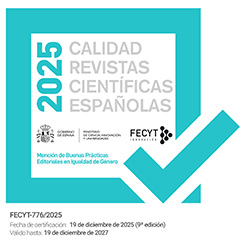Trauma and Psychological Self-Destruction: An Overview of the Exasperating Emotional Imbalance in K R Meera’s The Unseeing Idol of Light
DOI:
https://doi.org/10.17561/grove.v30.8027Keywords:
trauma, vision, love, self-destruction, emotion, insightAbstract
The present article discusses trauma and its impact on human emotions, particularly on women, in literature, with a focus on K R Meera's novel, The Unseeing Idol of Light. The research paper highlights the rise of trauma theory in literature and explores the cultural and psychological influence of trauma in literature. It also analyses the characters in the novel through the lens of emotional imbalance and interdependency and examines the interrelation between vision, love, and trauma. The prevalence of negative emotions over positive emotions in the novel has been discussed. The paper emphasises the importance of mental stability in contemporary society and discusses various themes such as psychic changes, loss, longing, and transformation. The researcher aims to analyse and relate the selected work with critical thinking to shed light on the cultural and psychological impressions of literature.
Downloads
References
Ashmore, Richard D., and Lee Jussim. “Introduction.”Self and Identity: Fundamental Issues. Oxford University Press, 1997, pp. 3-19.
Balaev, Michelle. Contemporary Approaches in Literary Trauma Theory. Palgrave Macmillan, 2014.
Barthes, Roland. Camera Lucida: Reflections on Photography. Translated by Richard Howard, Noonday, 1981.
Baudrillard, Jean. Why Hasn’t Everything Already Disappeared? Translated by Chris Turner, Seagull, 2010.
Berman, Steven L., Marilyn J. Montgomery, and Kaylin Ratner. “Trauma and identity: A Reciprocal Relationship?” Journal of Adolescence, vol. 79, no. 1, 2020, pp. 275-278. https://doi.org/10.1016/j.adolescence.2020.01.018
Borradori, Giovanna. Philosophy in a Time of Terror: Dialogues with Jurgen Habermas and Jacques Derrida. University of Chicago Press, 2003.
Bouson, J. Brooks. Embodied Shame: Uncovering Female Shame in Contemporary Women’s Writings. New York State University Press, 2009.
Caruth, Cathy. Trauma: Explorations in Memory. John Hopkins University Press, 1995.
Caruth, Cathy. Unclaimed Experience: Trauma, Narrative, and History. Johns Hopkins University Press, 1996.
Davis, Colin and Hanna Meretoja. “Introduction.” The Routledge Companion to Literature and Trauma. Routledge, 2020, pp. 1-8.
Erikson, Kai. A New Species of Trouble: The Human Experience of Modern Disasters. W.W. Norton, 1994.
Freud, Sigmund. The Origin and Development of Psychoanalysis. NuVision Publications, 1910.
Foucault, Michel. “Technologies of the Self: A Seminar with Michel Foucault.” Edited by Luther H. Martin, Huck Gutman, and Patrick H. Hutton, University of Massachusetts Press, 1988.
Ganzevoort, R. “Scars and Stigmata: Trauma, Identity and Theology.” Practical Theology, vol. I. no.1, 2008, pp. 19-31, https://doi.org/10.1558/prth.v1i1.19
Hartman, Geoffrey H. The Longest Shadow: In the Aftermath of the Holocaust. Indiana University Press, 1996.
Heidarizadeh, Negin. “The Significant Role of Trauma in Literature and Psychoanalysis.” Science Direct Procedia- Social and Behavioral Sciences, vol. 192, 2015, pp. 788- 795, https://doi.org/10.1016/j.sbspro.2015.06.093
Hutchison, Emma, and Roland Bleiker. “Emotional Reconciliation: Reconstituting Identity and Community after Trauma.” European Journal of Social Theory, vol. 11, no. 3, 2008, pp. 385–403, https://doi.org/10.1177/1368431008092569
Kellermann, Peter Felix. Sociodrama and Collective Trauma. Jessica Kingsley Publishers, 2007.
LaCapra, Dominick. History in Transit: Experience, Identity, Critical Theory. Cornell University Press, 2004.
Luckhurst, Roger. The Trauma Question. Routledge, 2008.
MacCurdy, Marian Mesrobian. The Mind’s Eye: Image and Memory in Writing about Trauma. University of Massachusetts Press, 2007.
Marder, Elissa. “Trauma and Literary Studies: Some “Enabling Questions”, Reading On, no. 1, 2006, http://readingon.s3-website-us-east-1.amazonaws.com/issue1/articles/Marder/RO%20-%202006%20-%20Marder.pdf
Meera, K. R. Hangwoman. Translated by J. Devika. Penguin, 2016.
Meera, K. R. The Poison of Love. Translated by S. Ministhy. Penguin, 2017.
Meera, K. R. The Unseeing Idol of Light. Translated by S. Ministhy. Penguin, 2018.
Mucci, Clara. Beyond Individual and Collective Trauma: Intergenerational Transmission, Psychoanalytic Treatment, and the Dynamics of Forgiveness. Karnac Books, 2013.
Pederson, Joshua. “Speak, Trauma: Toward a Revised Understanding of Literary Trauma Theory.” Narrative, vol. 22, no. 3, 2014, pp. 333-353. https://www.jstor.org/stable/24615578
Sütterlin, Nicole A. “History of Trauma Theory.” In The Routledge Companion to Literature and Trauma. Edited by Colin Davis and Hanna Meretoja. Routledge, 2020, pp. 11-22.
Tal, Kali. Worlds of Hurt: Reading the Literatures of Trauma. Cambridge University Press, 1995.
Van Der Kolk, Bessel. The Body Keeps the Score: Brain, Mind and Body in the Healing of Trauma. Penguin, 2015.
Vickroy, Laurie. “Voices of Survivors in Contemporary Fiction.” In Contemporary Approaches in Literary Trauma Theory. Edited by Michelle Balaev. Palgrave Macmillan, 2014.
Whitehead, Anne. Trauma Fiction. Edinburgh University Press, 2004.
Published
Issue
Section
License
Copyright (c) 2023 Sruthi S, Dr. Savitha A R

This work is licensed under a Creative Commons Attribution 4.0 International License.
Authors who publish with this journal agree to retain copyright and grant the journal right of first publication with the work simultaneously licensed under a Creative Commons Attribution License that allows others to share the work with an acknowledgement of the work's authorship and initial publication in this journal. Also, authors will retain the rights on their work, even if they will be granting The Grove. Working Papers on English Studies a non-exclusive right of use to reproduce, edit, distribute, publicly communicate and show their work. Therefore, authors are free to engage in additional, independent contracts for non-exclusive distribution of the works published in this journal (such as uploading them to an institutional repository or publishing them in a book), as long as the fact that the manuscripts were first published in this journal is acknowledged.

























